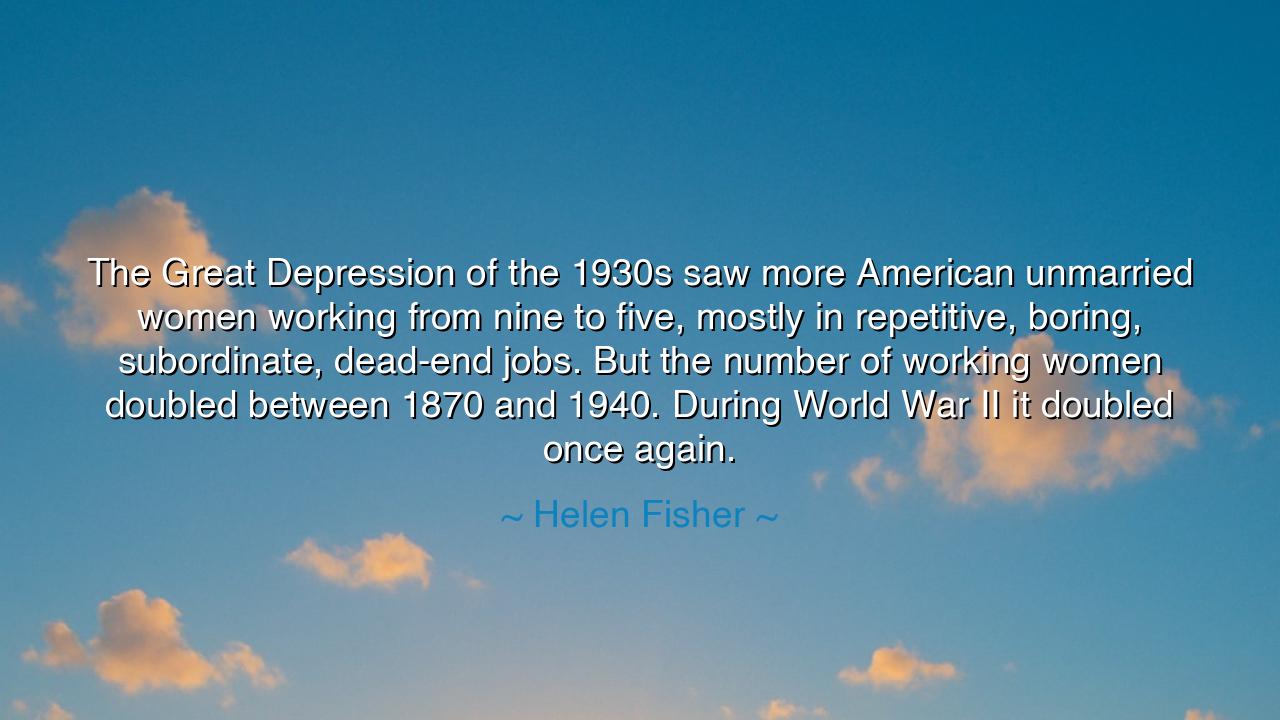
The Great Depression of the 1930s saw more American unmarried
The Great Depression of the 1930s saw more American unmarried women working from nine to five, mostly in repetitive, boring, subordinate, dead-end jobs. But the number of working women doubled between 1870 and 1940. During World War II it doubled once again.






“The Great Depression of the 1930s saw more American unmarried women working from nine to five, mostly in repetitive, boring, subordinate, dead-end jobs. But the number of working women doubled between 1870 and 1940. During World War II it doubled once again.” Thus wrote Helen Fisher, the scholar of human nature and love, who, in this reflection, turns her gaze upon the slow but unstoppable rise of women in the modern age. Her words carry the rhythm of transformation — the unfolding of a great awakening that reshaped the destiny of half the human race. Beneath her calm recounting of numbers and years lies the thunder of a silent revolution: the march of women from the margins of dependence toward the light of autonomy and purpose.
In this quote, Fisher speaks not merely of labor statistics or economic shifts, but of evolution — both social and spiritual. The Great Depression, though an age of scarcity and despair, became a crucible in which women’s endurance was tested and refined. While men wandered the streets in search of work, women filled the offices, the factories, the schools — not as adventurers, but as survivors. They took up roles deemed dull and subordinate, yet through those humble labors, they laid the foundation of a new world. Each keystroke, each ledger entry, each weary hour behind a desk was a quiet rebellion against invisibility. Out of monotony was born the momentum of change.
To the ancients, the goddess of fate was often depicted spinning threads — weaving the destinies of mortals. In the twentieth century, it was women themselves who became the weavers, threading their labor into the vast tapestry of civilization. The repetition of those early office and factory tasks, though thankless, forged discipline and independence. It was the sound of typewriters, not swords, that heralded this new revolution. And when the fires of World War II ignited the globe, it was women who stepped forward to sustain the world that war had shattered. They became engineers, welders, farmers, and leaders — proving through action what had been long denied in theory: that ability has no gender.
Consider the story of Rosie the Riveter, the symbol of that era — not a single woman, but the face of millions. Her rolled-up sleeves, her steady gaze, her clenched fist spoke louder than any declaration: “We can do it.” Yet behind that emblem of strength were real women — mothers, daughters, sisters — who had once been told their place was only in the home. When war called, they built airplanes and ships; when peace returned, many were told to step aside again. But the spirit that had awakened in them could not be put back to sleep. The doubling of women in the workforce, as Fisher notes, was not only a matter of necessity — it was the dawn of awareness. Once a woman has tasted her own power, she will not forget its flavor.
Helen Fisher’s words thus reveal the deep paradox of progress: that suffering often becomes the soil of renewal. The Great Depression, the wars, the hardships — these were not mere catastrophes, but catalysts. They forced women, and indeed all of humanity, to redefine what it means to work, to survive, and to create. Out of crisis, the seeds of equality took root. What began as endurance became empowerment. What began as drudgery became destiny.
The ancients would have seen in this the turning of an age, the shifting of the cosmic balance. For too long, humanity had lived with one wing bound — the voice of woman muted, her strength dismissed. But as Fisher’s timeline shows, history bends toward balance. The expansion of women’s labor was not only an economic transformation but a spiritual restoration. Through work, women reclaimed their agency; through perseverance, they rewrote the meaning of worth. The dull office and the roaring factory became sanctuaries of progress, temples of silent revolution.
So, my friend, take this as your lesson: progress is not always born in glory. Sometimes it grows quietly, through repetition, through weariness, through unseen courage. The power of women — and indeed of all people — lies not only in their triumphs, but in their persistence through the long hours of invisibility. If you would honor their legacy, then labor in your own life with that same resilience. Do not despise humble beginnings, nor grow weary in your pursuit of meaning. For every act of effort, however small, adds its thread to the tapestry of time.
And remember, as Helen Fisher teaches through the echo of history: from struggle arises strength, from endurance arises freedom, and from the quiet toil of the unseen comes the transformation of the world. The women of the Depression and the war did not set out to be heroines, yet by their constancy, they became them. Let their story remind us all — men and women alike — that every generation’s progress depends on the courage of those who work, endure, and refuse to yield.






AAdministratorAdministrator
Welcome, honored guests. Please leave a comment, we will respond soon